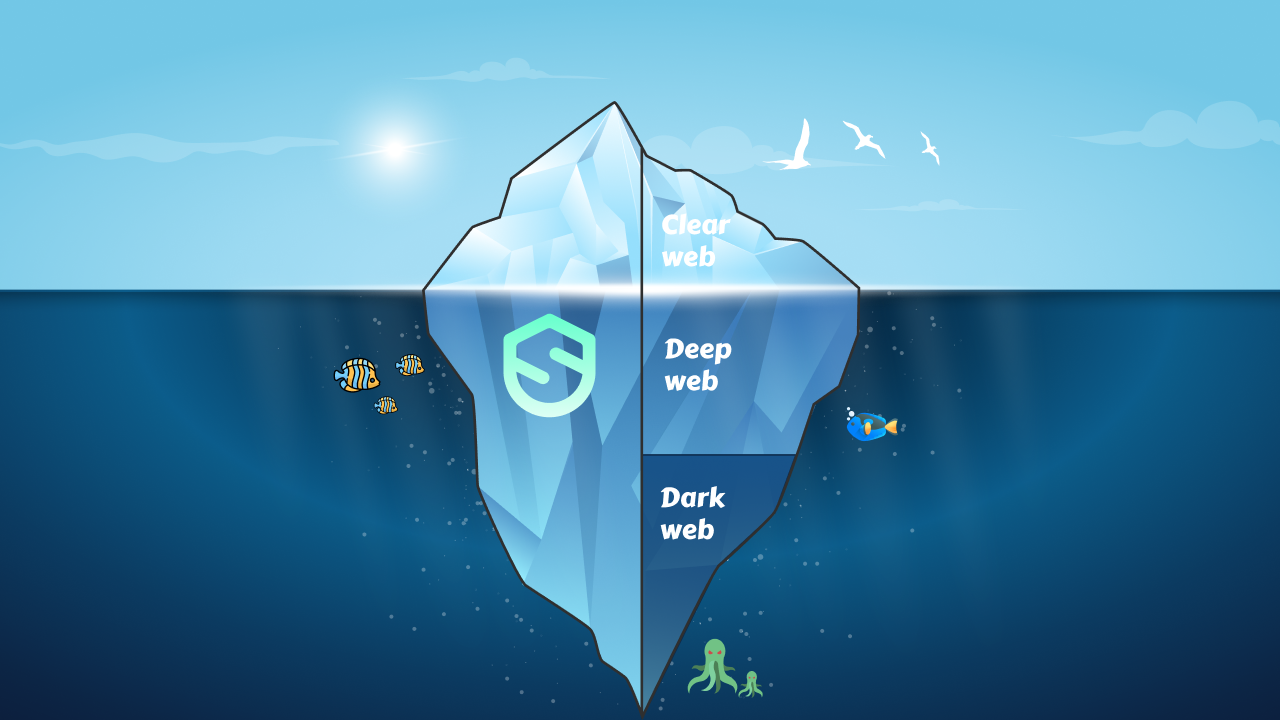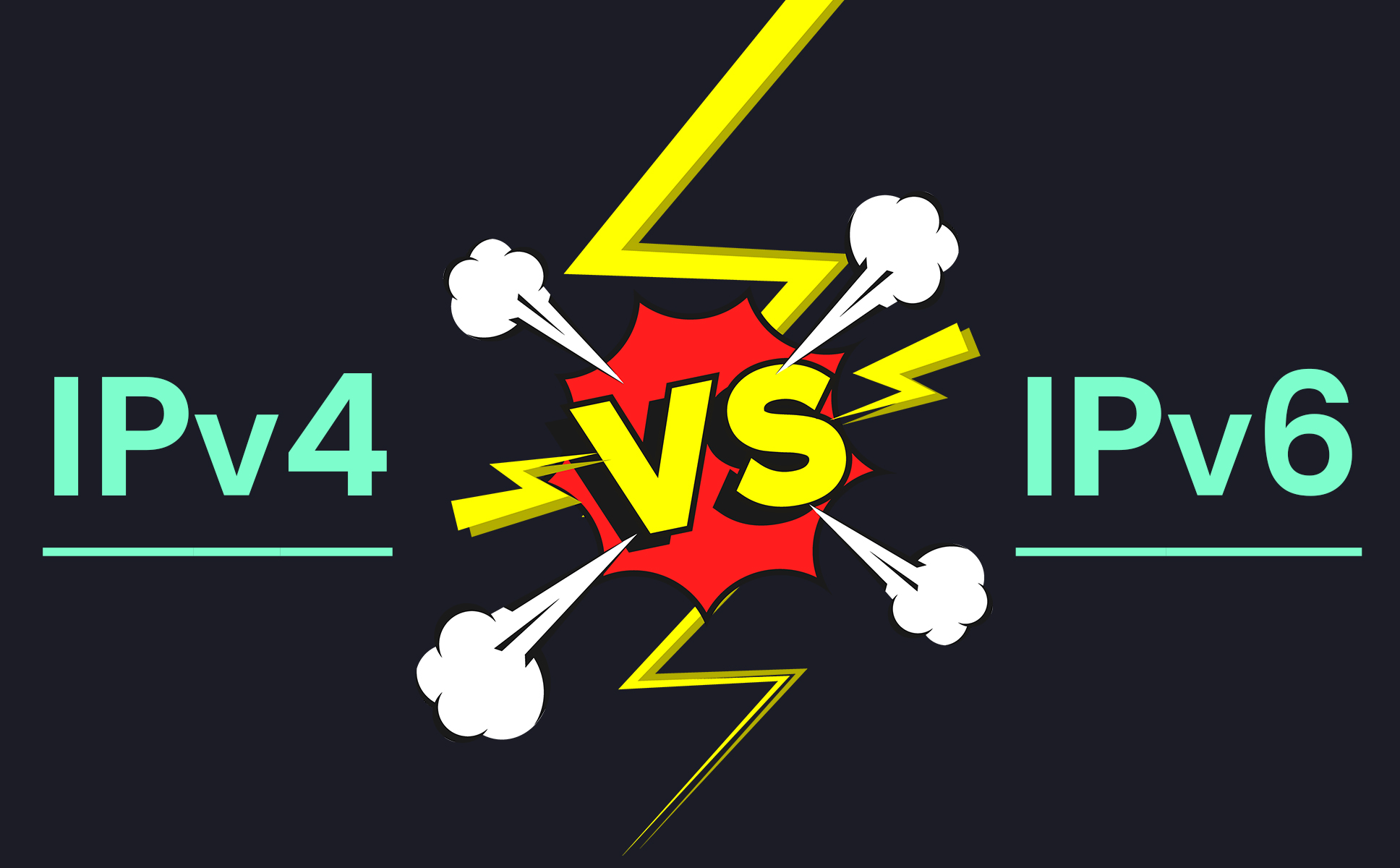Deep Web vs. Dark Web
Are you aware that the well-known Internet you regularly browse, often referred to as the "surface" web, constitutes only a small 5% of the entire network? The total number of websites on the "surface" web has exceeded 3.3 billion, but this is just the tip of the iceberg.

So, what about the remaining 95%? This is what we call the "deep web." When you think of the deep web, what comes to mind? Illicit activities? Phishing and fraudulent schemes?
Well, you’d be kind of right…and kind of wrong. The deep web encompasses the "gated" internet, or simply put, pages that aren't readily accessible. The terms "deep web" and "dark web" are often used interchangeably. So, what's the deal with these concepts of the dark web and deep web? What can you do on them? How can you access them? Is it risky? Let me clear the air with this brief introduction to the dark web for laymen. In this guide, I’ll walk you through the main concepts.
Surface Web vs. Deep Web and Dark Web

1. Surface Web
This is the part of the internet we use daily. It includes websites that can be easily found using search engines like Google, and you can visit them without requiring any special access or passwords.
2. Deep Web
- First and foremost, it's crucial to understand that the deep web and the dark web are not the same. The dark web is a subset of the deep web, but the reverse is not true.
- The deep web encompasses all pages that are not indexed, meaning most search engines won't display them in search results. Their web crawlers do not "see" these pages, rendering them effectively invisible to search engines.
- To access one of these pages, you either need to know its precise address (URL) or click on another link once you're in the deep web. Interestingly, the deep web can encompass significant portions of the legitimate, mainstream web, such as personalized pages on platforms like Netflix or Amazon, which are not meant to be indexed. Deep web sites can include:
- Private social media profiles.
- Bank account information.
- Email inboxes.
- Confidential corporate websites.
- Internal systems of companies and schools.
- Content behind paywalls.
- And much more.
3. Dark Web
Technically speaking, the dark web consists of content existing on darknets, closed-off networks built on top of the regular internet infrastructure. The terms "dark web" and "deep web" are used interchangeably, much like "World Wide Web" and "internet." However, unlike the clear net (surface web), the dark web is highly concealed, inaccessible through standard web browsers, and often associated with illegal activities.
One well-known example is the Tor Network (The Onion Router), although other networks like the Invisible Internet Project (I2P) also exist. Tor is the most renowned darknet globally, hosting .onion websites that require the Tor Browser for access. Yes, the dark web isn't just beyond the reach of search engines; it necessitates a specialized browser for entry.
The secrecy surrounding the dark web is essential because it contains:
- Criminal activities, such as dark web marketplaces for firearms, drugs, and various illegal items.
- Copyrighted books (as Tor and similar networks lack the speed for widespread pirated game and movie sharing).
- Secure drop sites for whistleblowers to safely expose corporate wrongdoing.
- Dark web versions of mainstream news websites, offering highly secure news access, particularly valuable in repressive regimes (though ISPs can detect Tor usage).
- Dark web forums, where discussions can quickly take a criminal turn.
- Unusual blogs, created for novelty or deeper purposes, such as tech enthusiasts chronicling adventures in exploring university maintenance tunnels.
- Dark web search engines, although their utility is limited due to the frequent shutdown of websites in these spaces.
Distinguishing Between the Deep Web and the Dark Web
Comparing the deep web to the dark web is akin to comparing apples and oranges, but since few people grasp this distinction, let's delve into it.
Scope
The deep web encompasses all content that requires a login for access. With over 5 billion internet users, each likely having multiple accounts (email, social media, online shopping, etc.), all this password-protected content falls within the deep web.
Conversely, the dark web mirrors the regular World Wide Web. It comprises websites and even a few search engines, with its own deep web containing user accounts and private areas.
Operations
The deep web operates just like the everyday World Wide Web. From a technical standpoint, there's little difference between transmitting the public Facebook homepage (which prompts you to log in) and navigating your account's interior (which may urge you to buy certain products).
Accessing the dark web demands greater technical expertise. The darknets it operates on are typically inaccessible via regular browsers. As mentioned earlier, the Tor Network necessitates the Tor
Browser for access.
Size
Fact: The internet is estimated to consist of 90-95% deep web content. Think about how many individuals see the Gmail login screen on the clear net compared to the number of Gmail accounts residing in the deep web. Apply this logic to everything else, and you begin to comprehend the vast scale of the deep web.
Due to the fluid and unofficial nature of the dark web, its true size remains unknown. However, due to its relative inaccessibility and limited appeal to primarily criminal elements and some activists, it is likely significantly smaller.
Applications
What can you find on the deep web? Anything that demands privacy and security:
- Safeguarding user privacy and data: webmail, online banking, cloud storage, restricted-access social media profiles, and pages, as well as certain web forums.
- Paywalled services: video-on-demand, online magazines, and newspapers.
The dark web delves even deeper, often requiring knowledge of specific web addresses to access even public content, let alone services. It includes:
- Hacker forums.
- Online drug marketplaces.
- News organization drop boxes for whistleblowers.
- Email communication channels for activists.
Security
The deep web is relatively secure, as it constitutes a regulated part of the internet, operating on established protocols. Vulnerabilities here often arise from user actions, such as inadvertently disclosing sensitive data through lapses in security. This can happen through phishing, malware, or hacking attempts.
The dark web is an ungovernable realm, where practically any website can contain hazardous content. Without a central authority to oversee them, website owners remain anonymous. Consequently, if you fall victim to scams or illegal activities on the dark web, there's no one to complain to.
Accessing the Deep Web and the Dark Web: Risks The risks associated with accessing the deep web versus the dark web share some similarities but also have distinct differences.
Risks of accessing the Deep Web
The primary risk of accessing the deep web is straightforward: someone may steal your login credentials. This could occur due to using unsecured public Wi-Fi, having your device compromised or infected with malware, and other similar factors.
Risks of accessing the Dark Web
Accessing the dark web carries dangers related to login data theft, along with additional concerns. These risks stem from the inherently chaotic nature of the dark web. Every downloadable file could potentially contain malware, any transaction might be a scam, and any login link could be a phishing attempt. Furthermore, there's the potential to encounter disturbing or unsettling content.
Accessing the Deep Web or the Dark Web
Is it Illegal? In the broadest sense, accessing either the deep web or the dark web is not inherently illegal. To delve deeper into this:
Is it Illegal to access the Deep Web?
No, it is not illegal to access the deep web. If it were illegal, actions as commonplace as signing into your online accounts would also be prohibited.
Is it Illegal to access the Dark Web?
Accessing the dark web itself is not illegal. However, some countries are actively working to curtail the use of Tor and similar networks.
Regardless of whether you're on the deep web or the dark web, engaging in illegal activities remains illegal.
Accessing the Deep Web and the Dark Web safely
If you've ever received instructions on using the internet securely, you already possess the knowledge needed to access the deep web safely. Here's a quick reminder:
- Always use HTTPS for basic data security.
- Avoid clicking on suspicious links, as phishing and malware often spread through email and social media links.
- Refrain from downloading suspicious email attachments; follow phishing protection guidelines.
- When connecting to public Wi-Fi, use a Virtual Private Network (VPN) to safeguard your data, as public Wi-Fi networks may be compromised.
- Keep your firewalls and antivirus software up to date, as they are your first line of defense against compromises.
- Avoid logging in on public computers, as these devices may be compromised intentionally, and you may forget to log out or delete login details.
Accessing the Dark Web safely
Before delving into the dark web, take these precautions:
- Ensure all your software is up to date, including security patches.
- Utilize a VPN for an added layer of protection before using Tor.
- Exercise caution when clicking on links, both for your mental well-being and your device's safety.
- Never input personal or sensitive data on Dark web.
Conclusion: Deep Web is not the Dark Web
When comparing the dark web to the deep web, numerous distinctions become evident. By now, you've read this article and gained a basic understanding. Perhaps this has emphasized the importance of maintaining your privacy and security across all these realms? In that case, consider investing in a VPN for added protection.



